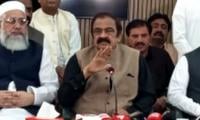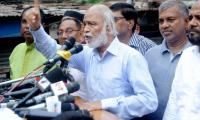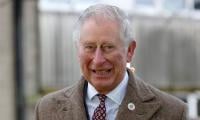LONDON: Mosques across the United Kingdom have stopped congregational prayers to protect worshippers from the viral Covid-19 outbreak.
Instead of hosting Friday sermons in mosques, clerics in the UK have used technology to continue praying with Muslims without incurring health risks by featuring the sermons live on social media platforms.
The Ilford Islamic Centre live-streamed its Friday sermon on Facebook. Addressing his community virtually, the Imam said Friday is a day of hope, but it is also a day to turn to Allah almighty and make special prayers and supplications to him.
The Imam further mentioned that mosques were closed and congregational prayers were suspended to protect the health of the worshippers.
On the first Friday after Prime Minister Boris Johnson announced the country’s lockdown and asked Britons not to come out of their homes unless absolutely necessary, no mosques opened for Friday prayers. Most Imams took to their social media pages to reach out to the faithful.
More than three million Muslims live in the UK, who are considered amongst the devout faith groups and regularly attend mosques. But the mosques have unanimously supported the advice sent out by health professionals and the government.
Famous scholar Allama Ghulam Rabbani told The News that it’s best to stay safe and stay at home. He added that students from all Ahle-Sunnat madrassahs have been sent home to continue their learning from home. He said affiliate mosques had stopped congregations even before Johnson made the announcement.
Earlier, funeral prayers of a British citizen of Pakistani origin in Luton were conducted in the graveyard while the mourners observed social distance during the prayers. The funeral prayers were led by Qazi Abdul Aziz Chisti who told the gathering: “I will request all of you to follow the law and keep a distance while you are praying the funeral prayers for the departed. There is no need to stand shoulder to shoulder during this time. May Allah alleviate the pain of the family.”
In a joint press release issued by over a dozen of the biggest Islamic associations in Britain — The Islamic Cultural Centre and London Central Mosque, Jamiat-e-Ulema Britain, East London Mosque and London Muslim Centre, Manchester Central Mosque, Birmingham Central Mosque and Glasgow Central Mosque — the entire Muslim community agreed to support the government’s ban on congregations.
The press release read: “Following the latest rulings (Fatwas) from many reputable Islamic scholars, Shariah boards as well as the latest UK governmental guidance and advice from medical organisations, the undersigned mosques have taken the unprecedented and difficult move to suspend all congregational services and activities.”
The joint press release stated that mosques owed a duty of care to the community and to the worshippers and thus, in these circumstances, congregational prayers would not be feasible.
It also cited a unanimously agreed maxim of Shariah law: “Preservation of life takes precedence over the public commission of significant acts of worship as well as the principle, harm is to be removed.”
Mosques across the Muslim world have also closed down congregational after global cases of coronavirus rose. Pakistan is one of the only countries where congregations are still going on, albeit in a limited capacity.
Opposition parties strongly criticised move, accusing BJP government of targeting Muslim community ahead of Eid
“Efforts of KP government, led by CM Ali Amin Gnadapur are yielding positive results,” he said in a statement
Despite progress, Khyber-Pakhtunkhwa and Balochistan remain epicentres of violence
As always, Geo Network has curated an exceptional lineup of programming to make Eid even more memorable
£275,000 vehicle was engulfed in flames, prompting bystanders to attempt to extinguish the fire
Bilawal Bhutto Zardari met with flood-affected women and informed them about details of houses







